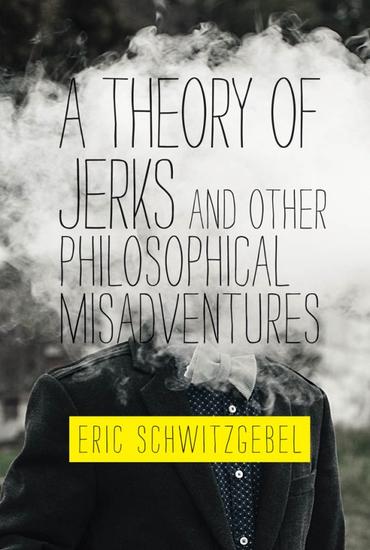
For Eric Schwitzgebel, the most efficient vehicle for a philosophical argument is an 800-word blog post.
Since 2006, Schwitzgebel, a professor of philosophy at the University of California, Riverside, has written “The Splintered Mind,” a blog that distills complex concepts into easily digested weekly musings. The digital archive now includes more than 1,000 entries on everything from the Hanukkah game dreidel’s moral lessons to the ethical challenges posed by advances in artificial intelligence.
“Academics sometimes think they have to dumb things down in order to talk to a broader segment of people, but I don’t agree,” said Schwitzgebel, whose areas of interest include the philosophy of psychology, philosophy of mind, and moral psychology. “I think of the blog as a place where I do real, active philosophy — it’s a way of synthesizing ideas.”
Released this week by The MIT Press, Schwitzgebel’s latest book, “A Theory of Jerks and Other Philosophical Misadventures,” is a compilation of 58 of his favorite pieces originally published on “The Splintered Mind.” It developed out of necessity: With so many posts available on the blog, a book was the simplest way for readers to discover which ones Schwitzgebel considers the most interesting.
“If there’s one message I’d like readers to take away from the book,” he said, “it’s that the world is a weirder, more wonderful, less comprehensible place than most of us realize or expect it to be.”
The book opens with the titular essay “A Theory of Jerks,” first published in 2014, in which the author sketches out his definition of a jerk and its opposite, the sweetheart. Whereas the jerk treats the people around him as “tools to be manipulated or fools to be dealt with,” the sweetheart sees them as “individually distinctive people with valuable perspectives,” according to Schwitzgebel.
Having a moral understanding of what constitutes a jerk is key, he writes, because it can help us learn to better spot and interact with these creatures in the wild. Another benefit? It can also help us better recognize if and when we’re being jerks ourselves.
Schwitzgebel turns the spotlight on some of his own peers — philosophers — in “Cheeseburger Ethics,” a piece about the behavior of professional ethicists. In fact, his empirical research suggests that ethicists don’t behave any better than professors who aren’t immersed in ethical study.
Along with his collaborator, the philosopher Joshua Rust, Schwitzgebel measured both ethicists’ and other professors’ behavior in a range of areas, including voting in public elections, calling one’s mother, eating the meat of mammals, donating to charity, responding to student emails, and organ donation, among others.
“Never once have we found ethicists as a whole behaving better than our comparison groups of other professors by any of our main planned measures,” Schwitzgebel wrote. “But neither, overall, do they seem to behave worse. For the most part, ethicists behave no differently from other sorts of professors — logicians, biologists, historians, foreign-language instructors.”
One of the book’s later chapters sees Schwitzgebel zero in on an especially odious ethical violation: support of Nazism in 1930s and ’40s Germany. Surveying 179 philosophy professors living in the country from 1932-45, he found that 58 were registered members of the Nazi party.
“This compares with estimates of about 21-25% Nazi party membership among German professors as a whole,” Schwitzgebel added. What’s more, about 30 of those 58 philosophers were classified as being on the far-right side of Nazism, meaning that in the sample studied “almost a fifth of professional philosophers thus embraced a political worldview that is now rightly regarded by most as a paradigm example of evil.”
The point is that ethical norms change, and because of this, it’s important that we continue to critically examine our own moral behavior, Schwitzgebel writes. How might future generations view us? If how we judge the behavior of people from the past is any indication, there’s a good chance those in the future might not view us favorably.
In pieces that tackle human-grade robots and driverless cars, Schwitzgebel imagines a future that’s closer than it may seem.
His interest in science fiction started in childhood, he said, but back then, most of the sci-fi he was consuming focused on space travel. That’s since been supplanted by artificial intelligence — a topic he thinks philosophers should also be approaching more seriously, too.
After all, as the topics Schwitzgebel has covered so far on “The Splintered Mind” illustrate, questions abound: What moral obligations do we have to the robots we create? Should we design them in a way that elicits more “moral” emotional reactions from humans? Will it help if they’re cute? If we become “gods” capable of engineering reality, will we be benevolent ones?
Header image by Franck V. via Unsplash





